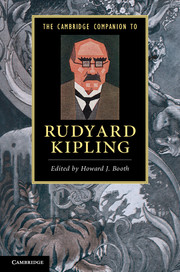Book contents
- Frontmatter
- Introduction
- 1 Kipling and the fin-de-siécle
- 2 India and empire
- 3 Kipling’s very special relationship: Kipling in America, America in Kipling
- 4 Science and technology
- 5 Kipling and gender
- 6 Kipling and war
- 7 Kipling as a children's writer and the Jungle Books
- 8 'Nine and sixty ways’: Kipling, ventriloquist poet
- 9 Kim
- 10 The later short fiction
- 11 Kipling and postcolonial literature
- 12 Kipling and the visual: illustrations and adaptations
- 13 Reading Kipling in India
- Further reading
- Index
2 - India and empire
Published online by Cambridge University Press: 28 September 2011
- Frontmatter
- Introduction
- 1 Kipling and the fin-de-siécle
- 2 India and empire
- 3 Kipling’s very special relationship: Kipling in America, America in Kipling
- 4 Science and technology
- 5 Kipling and gender
- 6 Kipling and war
- 7 Kipling as a children's writer and the Jungle Books
- 8 'Nine and sixty ways’: Kipling, ventriloquist poet
- 9 Kim
- 10 The later short fiction
- 11 Kipling and postcolonial literature
- 12 Kipling and the visual: illustrations and adaptations
- 13 Reading Kipling in India
- Further reading
- Index
Summary
The writings of Rudyard Kipling are thematically more various than the single topic of empire to which they are often reduced. Nonetheless, the British Empire of the late nineteenth and early twentieth centuries stood as the dominant concern of his prose and poetry throughout much of his career. He came of age as a writer when Britain was awakening to the advent of the 'new imperialism' - that phase of British imperial history, from 1882 to 1906, during which Britain, prompted by the rise of European imperial rivals and by the outbreak of nationalist uprisings throughout the Empire,- came to adopt a more self-conscious imperial policy. During that time, Kipling emerged as the unofficial laureate of empire, the writer who most clearly articulated the spirit of imperial consolidation and who most deeply inspired proponents of a more deliberately conceived and energetically prosecuted imperial project. When the new imperialism began to fade in popularity after Britain's indecisive victory in the Second South African War (1899-1902), he continued to advocate an assertive imperialism, but with increasing pessimism - less as a tonic for British expansionism than as an antidote to the national degeneration that he and others saw in Britain's inept performance in the war against the Boers. In the last two decades of his life, when imperial Britain was clearly waning, a bitter Kipling largely forsook his vision of a wide and powerful empire.
- Type
- Chapter
- Information
- The Cambridge Companion to Rudyard Kipling , pp. 23 - 36Publisher: Cambridge University PressPrint publication year: 2011
- 5
- Cited by



